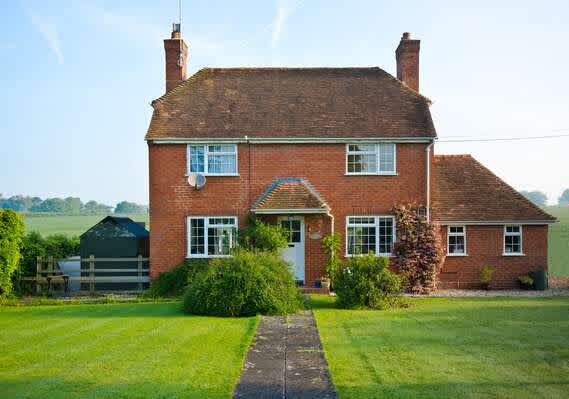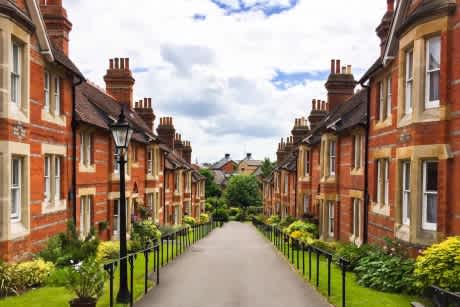Everything you need to know about mortgages
Essential mortgage information simplified.
How do mortgages work?
Mortgages are a way to borrow money to buy property. You can get a mortgage to buy a home to live in or a residential property to rent out.
Mortgages are secured against the property you’re purchasing until you’ve repaid what you borrow in full. If you fail to repay the mortgage, your lender can repossess the property and recover their money by selling it.
Due to the fact that mortgages are backed by an asset, the duration of mortgage terms is typically longer compared to other types of borrowing, often ranging from 25 years and, in some cases, extending up to 40 years.
Just like when you borrow money, mortgage lenders charge something called interest. At first, when you start paying off your mortgage, a bigger part of your monthly payments will go towards paying the interest, and a smaller part will go towards actually reducing the loan amount you owe.
As you make payments on your mortgage, the amount you owe will decrease over time. This means that a larger portion of your monthly payment will be allocated towards paying off the loan itself, and less will go towards the interest.

First-time buyers
Read helpful guides on buying your first home, see the latest mortgage rates and more.

Remortgage
From capital raise to switching lenders, learn how to remortgage quickly and efficiently.

Buy-to-let
Costs, taxes, and profit-making: learn all you need to know about buy-to-let mortgages here.

Next-time buyers
Moving up the property ladder? Discover mortgage tips and advice for a smooth homebuying process.
What types of mortgages are there?
The best mortgage deals for you will depend on your specific situation, whether you're planning to move or buying your first home. For instance, if you want to make extra payments on your mortgage to pay it off faster without incurring early repayment fees, or if you prefer to have consistent monthly mortgage payments to help you plan your budget, there are mortgage options available to accommodate these preferences.
Mortgages can either be repayment or interest-only. Repayment mortgages are the most common in the UK; with a repayment mortgage, you’ll pay the interest charged on your mortgage as well as the money you’ve borrowed, known as the capital.
With interest-only mortgages, you only make payments towards the interest on the loan amount. During this time, you are not required to pay off the principal balance of your mortgage.
There are different types of interest-only and repayment mortgages, such as:
Useful resources
SmartBuyer
All-in-one homebuying. Mortgage. Solicitor. Surveyor. Insurance. Done
Learning centre
Get the answers to the commonly asked questions our advisers hear everyday.
Mortgage lenders
First-time buyer? Moving home? Different lenders suit different requirements. See our lender breakdown to get informed data.
How to apply for a mortgage
Applying for a mortgage used to be a stressful process, but these days there are many ways to apply for a mortgage without even visiting a bank branch. Online mortgage brokers such as Better.co.uk have made the whole process so much easier.
We’ve broken the process down into simple steps to help you get started. Here’s how to get a mortgage to buy a new house.
Before you start house hunting, you’ll need to figure out how much you can afford to borrow with a mortgage. Using a mortgage calculator is a helpful step to get a rough idea of how much you’ll be able to borrow and what your monthly repayments could be.
Before you start searching for your new home, you’ll need to get a mortgage in principle. This demonstrates the approximate amount you could afford to borrow, based on the information you’ve provided and a soft credit check. You’ll need this before you make an offer on a property because the estate agent will request it as proof of funds, and it serves as evidence of your borrowing capacity.
Once you’ve found a property that ticks all your boxes and you have your mortgage in principle in place, you can make an offer to the seller. Make sure the offer you make is easily covered by your mortgage in principle and the deposit you’ve got saved because you’ll need to prove to the estate agent that you can afford to buy the property when you make your offer before they put your offer to the seller.
After your offer has been accepted, it’s time to proceed with the mortgage application. Our team of mortgage brokers are here to assist you in finding the most suitable mortgage deal and guide you through the application process. We'll work with you to ensure you have the right mortgage for your needs and provide support every step of the way.
Once you’ve received your mortgage offer and completed on your new home, it’s time to start making your monthly repayments. If you’ve got a fixed-rate mortgage, you may want to remortgage when your fixed period ends to avoid moving onto your lender’s standard variable rate (SVR).
Getting a mortgage is a big financial decision; you’ll need to consider whether you can afford to keep up repayments for the foreseeable future and if interest rates were to rise in the future.
It’s worth taking the time to research your options and make sure you have a reasonable deposit and good credit history before applying for your mortgage. Our expert mortgage brokers can help you find the right mortgage deal for you, taking into account your circumstances.
Jonathan Bone - Lead Mortgage Adviser
Mortgage FAQs
There are a number of factors that can affect your ability to get a mortgage. All lenders will have their own eligibility criteria, meaning you may be rejected by some lenders but accepted by others.
Typically, your eligibility for a mortgage will be based on the following factors:
How much you want to borrow
How much deposit you have
Your monthly income
Your monthly outgoings
Your employment status
Your credit history
The property you want to buy - some lenders won’t offer mortgages on listed buildings, high-rise flats or homes made from non-standard materials, for example.
To increase your chances of successfully getting a mortgage, it’s a good idea to use a mortgage broker. Our expert mortgage brokers compare thousands of deals from over one hundred different lenders and can help you pick the right mortgage deal for your circumstances.
Once you’ve found the right mortgage deal for you, it’s time to start the application process. When you apply for a mortgage, the lender will run a hard credit check to find out how you’ve managed credit in the past and double check there’s nothing in your credit report that would mean you’re not eligible.
You’ll need to provide some documentation with your mortgage application. The exact documentation you’ll need will vary depending on the type of mortgage you’re applying for, your financial situation and your lender, but will typically include:
Bank Statements (typically from the last three months) - Lenders will use these to look at your regular outgoings and whether you’re able to afford the monthly repayments.
Proof of Income - This will typically be payslips from the past three months. Lenders can also request to look at your bank statements to assess whether you have a regular income to cover your monthly payments.
Proof of ID - Such as your passport or driving licence.
Proof of address - Such as a recent utility bill, council tax bill or bank statement. Any documents you supply for proof of address should be dated within the last three months.
Proof of deposit - You’ll need to prove where your deposit came from. If you’ve saved your deposit and are currently holding it in a savings account, you’ll need to provide a bank statement for this savings account, you may be asked about any significant deposits into the account. If you’ve been gifted the deposit, you may need a signed letter from the person gifting you the deposit.
Buying a house and applying for a mortgage can often be a lengthy process, but the actual time it takes to apply for a mortgage will vary.
How long your mortgage application takes will depend on a variety of factors, such as the complexity of your financial situation, the efficiency of the lender and also how quick you are at responding to any queries your lender or broker may have.
When you apply for a mortgage through Better.co.uk, your case manager will be on hand to help you through the whole application process, chasing the lender when necessary and keeping you informed every step of the way.
Mortgage offers are only valid for a fixed timeframe. This will vary between lenders but mortgage offers typically last between three and six months.
If completion on your new property is delayed, you may be able to ask your lender to extend your mortgage offer for a further three to six months, but you may need to reapply for the mortgage if your offer isn’t extended.
Typically mortgage terms are between 25-35 years, but there are some lenders on the market who offer mortgages over 40 years. The mortgage term you’re able to get is likely to depend on your age; for example, if you’re an older borrower, you may struggle to be approved for a lengthy mortgage term.
How do I get the best mortgage rates?
The interest rate you receive on your mortgage can be influenced by various factors. Following the steps below will help you to get the best mortgage rates for your circumstances:
Use a mortgage broker: Our expert mortgage brokers will be able to help find the right mortgage deal for you.
Work on your credit score before you apply: Your credit score will impact the mortgages you’re eligible for, and like most borrowing products, the best rates are typically reserved for reliable borrowers with a good credit history.
Having a reasonable deposit: The Loan-to-Value (LTV) of your mortgage, how much you borrow vs the value of your house, can have a significant impact on the mortgage rates you’re offered. Borrowers with larger deposits typically pose less risk to the lender because the property's value is significantly higher than their investment, and you’re less likely to fall into negative equity if house prices fall.
A mortgage deed is a legally binding contract between you and your lender, which is secured against your property. When you successfully apply for a mortgage, you’ll need to sign your mortgage deed.
A mortgage deed outlines the conditions of your mortgage, the total amount you’ll need to repay and the terms of the mortgage loan. You’ll need to sign a new mortgage deed if you remortgage your property.
There are some circumstances where a mortgage offer can be withdrawn, typically when you have a change in circumstances, such as losing your job, the lender finds you’ve given inaccurate or false information on your application or if the surveys carried out find an issue with the property you wish to purchase.
Get a mortgage with Better.co.uk today
Our remortgage customers saved an average of £290 a month in August 2023*
Better.co.uk is a fee-free mortgage broker
5-star Trustpilot rating from over 5,000 reviews
Compare mortgage deals from over 100 lenders
Skip the paperwork: apply online any time
Important info & marketing claims
You may have to pay an early repayment charge to your existing lender if you remortgage. Your savings will depend on personal circumstances.
Your home may be repossessed if you do not keep up repayments on your mortgage.
*The savings figure of £406 is based on Better.co.uk remortgage customers in February 2024. Read more on our marketing claims page.
We can't always guarantee we will be able to help you with your mortgage application depending on your credit history and circumstances.
Average mortgage decision and approval times are based on Better.co.uk's historic data for lenders we submit applications to.
Tracker rates are identified after comparing over 12,000 mortgage products from over 100 mortgage lenders.
As of January 2023, Better.co.uk has access to over 100 lenders. This number is subject to change.
For buy-to-let landlords, there's no guarantee that it will be possible to arrange continuous letting of a property, nor that rental income will be sufficient to meet the cost of the mortgage.
